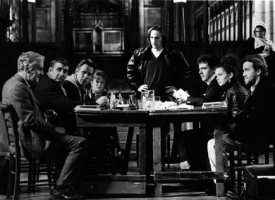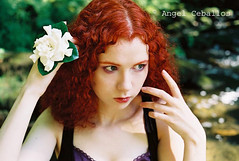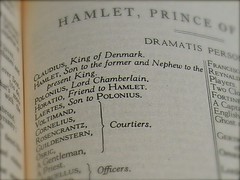
Hamlet played by Joe Harper
Directed by Joe Harper
It's December 1995, I'm at university the first time around and I live very close to the one cinema I would say that I ever really loved, The Hyde Park Picture House in Leeds. In The Bleak Midwinter turned up pretty much unheralded but I'd read about it in Empire Magazine who gave it a sparkling review and having loved everything else Kenneth Branagh had directed (yes, even Dead Again) and being someway into a lifelong appreciation of Shakespeare I knew had to go and see it..
The Hyde Park was the kind of cinema in which any film could potentially be packed out because the audience tended to go see whatever was on. I took my tall friend Dave with me, even though he wasn't sure if it was his kind of thing - in black and white and about theatre - and we sat at the back of the balcony because there was more legroom.
I'd like to be able to give you a long flowing description of the experience of seeing it for the first time but I really can't. I remember being enchanted and laughing a lot and feeling very Christmassy afterwards and Dave saying that it wasn't what he was expecting and that he really enjoyed it but other than that I'd say that it just made me more excited about seeing Branagh's Hamlet the following year, this almost being a rehearsal for that.
It wasn't until the following Christmas, when I was given the video that I really fell for the film. There was certainly the nostalgia factor - I'd left university by then and it reminded me of a good night out at a place that I wouldn't necessarily be able to go back to with someone I hadn't seen in months. But it was also that it somehow managed to distill everything I felt about Shakespeare into an hour and a half and was also brilliantly funny and touching.
The following year, in 1997, I watched it around Christmas time again while I was wrapping my presents. And again in '98 and since then it's become part of the ritual. When I say that I watch it every Christmas, I really do. Which seems like the definition of a favourite film. Each viewing it means more or less to me than the year before depending on what else is happening in life. Last year I was at university again nd it just fitted into the many hundreds of other films I seemed to be watching. This year I noticed that the main character mentions in his opening monologue that he's thirty-three and I realised that I'd be the same age as him next time I see it.
Perhaps I should provide some background because I know that this isn't a film many people have heard of (it's not even available on dvd). In The Bleak Midwinter (or A Midwinter's Tale as it's called in the US) features Branagh and Shakespeare stalwart Michael Maloney as Joe an out of work actor who decides to produce Hamlet at Christmas time in a disused church in his sister's home village of Hope. With him are a group of actors, some in the offseason from seaside shows, all with their own neuroses and the film charts the rehearsal process and the production. It very much follows the structure and style of the Hollywood backstage films from the heyday of the studio system, except with obvious nods and influences from sources as diverse as Woody Allen, Ealing comedies and silent cinema.
Branagh says that it isn't autobiographical, but when Joe describes his passion for the play, that he saw it when he was fifteen and it changed his life that's exactly what the director has said about seeing Jacobi at the RSC all those years ago. His motivation for making the epic film version of the play later mirrors one of Joe's needs here - to try and make something which has a reputation for being musty and boring and making it exciting for a new generation, essentially dragging out of slow amateur schoolroom readings.
Having tried acting and been around a few actors I can absolutely say that the film captures the brilliance and pain of the art, the fact that it can boil down to bringing the deep seated emotional crap that you try to suppress up to the surface in order to entertain others. But what is really clever, is that having suggested from the opening that all of the characters are pretentious and affected and everything everyone expects actors to be - John Session's raving queen and Richard Briers grumpy old man, for example, in a series of carefully chosen two-handers he carefully peels away the surface and reveals them to be perfectly normal people like us, absolutely aware of the mask they're otherwise wearing to get by in the profession.
I think the film was derided at the time as another opportunity for Ken to give his chums something to do, but I thought it was unfair, particularly since it allows them to reproduce the fragile chemistry that any short term group dynamic has but also because many of them are producing what I think are career best performances. People like John Sessions or Celia Imrie, so often stuck playing grotesques and eccentrics are brilliant here when demonstrating the serious side of their all too camp exteriors. Gerard Horan, latterly typecast as policeman is beautifully touching as Carnforth the man with the drink problem. To be honest the only weak link is Jennifer Saunders with her mad American accent who looks like she's charged in from a Comic Strip skit, but there no doubt she's fulfilling the role of the big producer redolent of the genre.
The film is composed rather like a something from earlier in that century - most of the action plays out in medium or wide shots in deep focus with the actors moving into the foreground and back again creating the effect of seeing characters on a theatre stage - there are very few close ups and they only appear late in the film as the group is fractured and the infighting and arguments have begun in earnest. There are montage sequences, such as the audition process and the costuming but Branagh uses a series of jump cuts and juxtapositions to move the story forward.
Branagh employs lighting akin to film noir which fits the mood of the play in production and there are some lovely compositions as the actors walk in and out of silhouette.
Noir is also implied in the costumes that are finally selected for the production within the film which have a kind of 40s gangster style - and there's a spectacular use of a machine gun which accentuates that idea which I don't want to give away. There's also very little music. The film opens with Noel Coward singing 'Why Must The Show Go On' and ends with a plucked instrumental version of the titular Christmas carol. It's a brave stylistic choice but it gives room for the actor's performances to provide the emotional core and make the one musical moment from inside their story - when Nina (Julia Sawalha) sings Ophelia's lament - all the more heartbreaking.
It has dated slightly. One of the jokes hinges on Mighty Morphin Power Rangers which to be honest seemed out of the date at the time although the target audience will at least have heard of it - I'm not sure what the equivalent now would be - probably Xbox or Wii. Also, when Nicholas Farrell's Tom is auditioning for Laertes, he goes into a wild digression about how relevant Hamlet it and mentions that it's like Bosnia. That would be Iraq now I suppose. One element that hasn't aged is the crucial plot point of the filming of a giant sci-fi trilogy that could be the new Star Wars, especially since we've actually had a new Star Wars trilogy (coindentally featuring Celia Imrie as a fighter pilot) and since and everything seems to be about pre-planned franchises and series now.
Some other things I noticed watching it again the other night - the (uncredited) puppet theatre girl in the audition scene is Katy Carmichael who played Twist in the sitcom Spaced. The brilliance of the acronym LCA - Less Crap Acting. Joan Collins as Joe's agent gives probably her best performance since classic Star Trek's City of the Edge of Forever. That Maloney is the best Doctor Who we never had and is completely wasted playing the range of wackos always seems to now in tv dramas - this is the man who stole Juliet Stevenson from Alan Rickman in Truly Madly Deeply after all.
Stylistically different to anything else what Branagh has directed but still with that love of theatre and theatrics, it touches me each year and even with the darkness, somehow manages to put me in the Christmas mood. There is a scene in which people talk about what makes their life worth living and someone mentions Brief Encounter and offers to buy someone as a present. Do yourself a favour and hunt a copy of this down in time for next Christmas because if you're a reader of this blog I really think you'll enjoy it.









